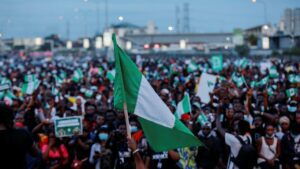


New minimum wage and the informal sector
The Minimum Wage Act of 2019 signed by former President Muhammadu Buhari set the amount at N30,000. Five years later, not all governors are paying the current wage award which expired in April. The Act is to be reviewed every five years to meet up with contemporary economic demands of workers.
The informal sector has the dominant population of citizens, what provision is the government making to cater for them other than palliatives. The Muhammadu Buhari leg of the All Progressives Congress, APC, Federal Government failed to wave the magic wand they had promised during the campaigns towards the 2015 presidential election. Instead, the economy was left in utter ruin as Buhari handed over to Bola Ahmed Tinubu on May 29, 2023.
From day one, the current government deftly transferred the burden of petrol subsidy removal to Nigerians one month ahead of the supposed take-off time, skyrocketing pump price above 300 percent. The Central Bank of Nigeria, CBN, floated the Naira against its foreign counterparts, thus eliminating the differential between the official and black market rates. Within weeks, the Naira tumbled to almost N2,000 to the Dollar.
Businesses – the big, small and multinationals – started closing down or leaving the economy because of the astronomical cost of production. Unemployment and hunger worsened. Inflation hit the highest point in our living memory.
Not done yet, the Federal Government announced the hike of electricity tariff from 68kwH to 225kwH as from April 1, 2024. The CBN had also instructed the banks to collect 0.5 percent levies on transactions, until public outcry led to a paise of the instruction. As a result of these and other government-induced price increases, other service providers, notably Multichoice, have announced their own price increases.
Government policies, rather than fix the economy, keep eating away the real income of the populace. The struggling middle class, meant to be the social safety buffer between the rich and poor, is near extinction.
All palliative measures announced by the Federal Government – salary awards, cash transfers, introduction of gas-powered public transport vehicles and release of food from the strategic reserves – are yet to produce meaningful economic impact. Yet, this government is responsible for the appointment of the highest number of ministers ever in Nigeria’s history.
Judging from the foreign economic trips and elements of the controversial Lagos-Calabar Coastal Highway contract, the controllers of governance live in a different world of their own. There exists a gulf between the leaders and the populace.
This disparity has not gone unnoticed. If we must tighten our belts to rebuild the economy, the leaders ought to set the example. Without being a part of the travail, how will the leaders be inspired or motivated to lead well and get us out of this mess?
Nigeria’s progress is dependent on the accountability of its leaders, and more importantly, their sense of humanity. History books are replete with demagogues in the guise of political leaders. The renewed hope agenda should prove its antagonists wrong. Nigeria can be fixed, its people are not hopeless. The ball is in the court of the elected leaders.


